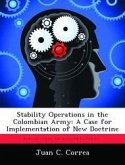Special Forces (SF) has several characteristics that distinguish it from other forces in the U. S. military. Among these characteristics are a high level of maturity, a broader experience level, and regional orientation. Because of these characteristics, Joint Force Commanders (JFCs) in Stability and Support Operations (SASO) frequently request the inclusion of SF in SASO operations and rely on SF to assist them in accomplishing their mission. One area of concern for SF in SASO environments is that SF has no doctrine that specifically addresses how SF supports SASO mission. Doctrine should perform three functions. First it should explain to units executing a particular mission what the task will entail. Doctrine also should explain to the JFC and other supported units the nature of a particular task of which a mission consists. Finally, doctrine should guide unit training. This monograph examines three SASO case studies and how SF performed its mission. The three case studies are Panama, Haiti, and Bosnia. In the case studies, the JFCs assigned SF tasks that frequently they did not perform. This was due to a lack of understanding of what SF could do to assist the JFC in accomplishing the campaign objectives. In each case, SF was able to make substantial contributions despite the lack of a doctrinal mission. In all the case studies, SF units developed frameworks that furthered the JFC's objectives, but were not necessarily what the JFC had directed prior to the start of the operation. Finally, the monograph makes some recommendations. First, the monograph proposes an umbrella concept for the activities that SF has been conducting in SASO calling the concept, "Pacification and Legitimization." Pacification and Legitimization, as proposed consists of five sub-tasks: reporting, preventive intervention, presence, amelioration, and legitimization. The monograph further recommends that Pacification and Legitimization, however, not be adopted as a Special Operations Missio
Hinweis: Dieser Artikel kann nur an eine deutsche Lieferadresse ausgeliefert werden.
Hinweis: Dieser Artikel kann nur an eine deutsche Lieferadresse ausgeliefert werden.








